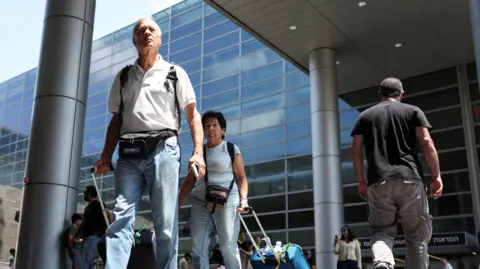First evacuation flight from Israel lands in the UK
 BBC
BBCThe first Britons evacuated out of Israel have landed back in the UK after a "long and intense" journey.
The RAF flight departed Ben Gurion Airport with 63 British nationals and their family members on Monday afternoon. The passengers landed at Birmingham Airport early on Tuesday morning.
One passenger said he was grateful to personnel on the ground, but was critical of the evacuation plan which has followed many other nations bringing citizens home, including the US and Portugal.
Israeli airspace was closed for 10 days - leaving thousands of Britons stranded - when the conflict started this month when Israel attacked nuclear sites in Iran, prompting Tehran to respond with missile strikes.
A second British evacuation flight took off from Tel Aviv on Tuesday afternoon, towards Cyprus, the Foreign Office confirmed.
Passenger Max Radford accompanied his elderly parents on the first British evacuation flight.
"It's been a pretty long and intense day", he said just moments after landing back in the UK.
Mr Radford emphasised that while he was "really thankful" to the RAF and Foreign Office staff, the evacuation plan was "shambolic every step of the way".
He accused the UK government of seemingly "making it up as they go along", saying that more needs to be done to get British citizens out of Israel.
"There are thousands of people - and 63 people on one flight, maybe once a day, is nowhere near enough," he said.
Downing Street said that around 1,000 people had asked for a seat on an evacuation flight – a quarter of the 4,000 who have registered their presence in Israel or the Occupied Palestinian Territories with the Foreign Office.
On Monday, the Foreign Office said further evacuation flights would be based on demand and the security situation. Israel reopened its airspace on Monday.
British nationals still in Israel have been urged to register their presence with the UK government.
 Louise Ellman
Louise EllmanFormer Labour MP Louise Ellman, 79, was staying in Jerusalem when Israel struck Iran on 13 June, leaving her stuck.
She told the BBC she filled in the forms for the flight as soon as they came out.
On Sunday, the Foreign Office told Ms Ellman to "pack your bags and be ready to leave at short notice".
She then was informed of her £350 place on the flight at 09:00 local time on the day it departed, and was told to be at the airport by midday.
"So then I got going very quickly," she said. The first flight to Cyprus was on a military aircraft, which Ms Ellman said was a "real experience".
"Everybody was intrigued by what was happening. I think everybody was excited to go but no one quite knew what was happening," she said.
"I felt a complete mix of emotions. I was relieved and pleased that I was going because I'd been trying to do that.
"But at the same time, I'd been thinking about what was happening in Israel and the people there. I was thinking about the people we'd left behind."
'We sang God Save The King'
Mr Radford, who paid £1,050 for three tickets, also said it was "ridiculous" that the plane had landed in Birmingham, accusing the Foreign Office of choosing the destination because it would be cheaper than landing in London.
Recalling a moment of positivity during the flight, however, Mr Radford said he would "never forget" how passengers started singing the Israeli national anthem and God Save The King on the plane.
"It just shows the togetherness and the spirit of the Jewish people of the UK," he said.
Rabbi Yehuda Pink, from the Chabad of Solihull, greeted the passengers arriving at Birmingham Airport together with staff from Solihull Metropolitan Borough Council.
While he could not comment on what happened in Israel, he told the BBC that once they arrived in the UK passengers were welcomed by council staff who "went over and above the call of duty" to make their arrival and onward journeys as smooth as possible.
"There was an entire welcome hub set up with medical staff, social workers and food, so anyone who needed could receive help or simply rest and have some food before journeying home," he said.
Richard Kafton, from North London, had travelled to Jerusalem with his wife at the start of June to celebrate the Jewish festival of Shavuot.
Their return flight was cancelled when Tel Aviv's airport was closed, and they became increasingly anxious to get home after having to seek safety in air raid shelters at least once a day.
Mr Kafton said he was "very disappointed" with the Foreign Office initially, describing the department as "very slow" and its messaging as "contradictory" at times.
"I was glad the Foreign Office got their act together," he said. "They need to increase the frequency of the repatriation service and to fine tune the service."
Mr Kafton was full of praise for the "absolutely superb" RAF and described the trip to Cyprus on the A400 military transport aircraft as "good fun".
In Cyprus the passengers were transferred on to a civilian aircraft, which made one stop to refuel in Athens before making its way to Birmingham.
The Foreign Office then arranged for taxis for some passengers to get home, Mr Kafton said.

A Foreign Office spokesperson said: "We are working around the clock to secure more flights and bring more people home. Yesterday was the first available slot when the airspace was open.
"A further flight is planned today [Tuesday] and more will be considered based on the security situation on the ground and levels of demand from British nationals.
"Our priority remains the safety of our British nationals, and all decisions are made with their welfare and physical safety front of mind. The situation remains volatile and the government's ability to run flights out of Israel and the OPTs could change at short notice."
On Tuesday morning, US President Donald Trump said a ceasefire between Israel and Iran was "now in effect", but later, said that both Iran and Israel violated it.
Israel and Iran exchanged heavy fire before the agreement was confirmed. The Israeli ambulance service said four people were killed, and 22 wounded, as a result of Iranian strikes overnight.
Tehran also faced a barrage of intense attacks, although the number of casualties is not yet clear.
